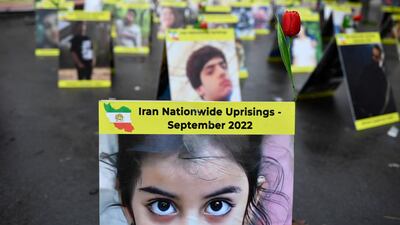Iran has executed the first protester known to have been convicted for taking part in current anti-government demonstrations.
The judiciary said he was executed on Thursday, after being found guilty of Moharebeh — enmity against God — for stabbing a security guard and blocking a street in Tehran. An appeal by his lawyer had been rejected.
Mizan news agency, which is affiliated to the judiciary, identified the man as Mohsen Shekari and said he had participated in “riots” and attacked a member of the Basij paramilitary group, in exchange for money.
A Twitter post by Iranian journalist and activist Masih Alinejad said that Mr Shekari was 23 and “gave his life for freedom”.
His execution, reported to have taken place just before sunrise, came a day after young protesters used national Student Day to voice their anger at authorities.
While Mr Shekari is the first protester in the recent demonstrations known to have been executed, 11 people have been handed death sentences for participating, according to the Oslo-based Iran Human Rights non-government organisation.
Activists say more than 500 people have been killed since the protest movement began on September 16, with least 18,000 detained — some held in secret prisons.
Protests were sparked by the death of Kurdish Iranian Mahsa Amini, 22, in the custody of the morality police. She had been detained in Tehran for wearing her hijab “improperly”.
Iran is one of the world's largest executioners. Last week, it executed four men arrested in June for co-operating with Israeli intelligence.
Among recent high-profile cases, it was widely condemned for the 2020 hangings of journalist Ruhollah Zam, who had been lured back from exile, and wrestler Navid Afkari, who was convicted of killing a security guard during anti-government protests.
On Tuesday, Tehran announced five people had been sentenced to death for the murder of member of the Basij militia, which has played a central role in the suppression of protests.
Trials against government dissidents are often held in revolutionary courts and are regularly condemned as sham hearings, during which those accused are prevented from speaking or seeing the evidence against them.
UK Foreign Secretary James Cleverly said he was "outraged" by Thursday's execution.
"The world cannot turn a blind eye to the abhorrent violence committed by the Iranian regime against its own people," he tweeted.
"The UK is opposed to the death penalty in all circumstances," he added.
US State Department spokesman Ned Price called the execution a "grim escalation" in Iran's crackdown.
"The execution of Mohsen Shekari represents a grim escalation in the regime's attempt to suppress dissent and quash these protests," Mr Price said.
Student Day
Meanwhile, on Wednesday, protests were reported at universities in Tehran, the north-eastern city of Mashhad, Shiraz, in south-central Iran, and other towns and cities, during Student Day.
This commemorates the murder of three Tehran students in 1953 by police of the Iranian royal dynasty, for protesting against a visit by then US vice president Richard Nixon.
This year, student groups had called for protesters to turn the anniversary into a “day of terror for the state”.
“If one of us is killed, there are a thousand others behind us,” students chanted in Mashhad, in footage published by the London-based Iran International news channel.
Universities have been protest hubs since the latest demonstrations began. As many as 600 students have been detained, rights groups have said.
On Wednesday, President Ebrahim Raisi visited the University of Tehran, thanking students for not turning his visit into “riots”.
On the same day, Time magazine published an article by actress Angelina Jolie, who spoke with Roya Piraei, whose mother, Minoo Majidi, was killed protesting in Kermanshah, in western Iran.
A photo of Ms Piraei standing by her mother's grave went viral.
Now in France, Ms Paraei told Ms Jolie her old self was buried with her mother, whose funeral drew large crowds in the Kurdish city.
“I have to move forward, because I should do my best to be a voice for the silenced voice of my mom and the other people who are being killed. She gave her life for what she believed in,” she told the UN special envoy.
“She was seeking freedom and justice for Mahsa and all the young generation like me.”


